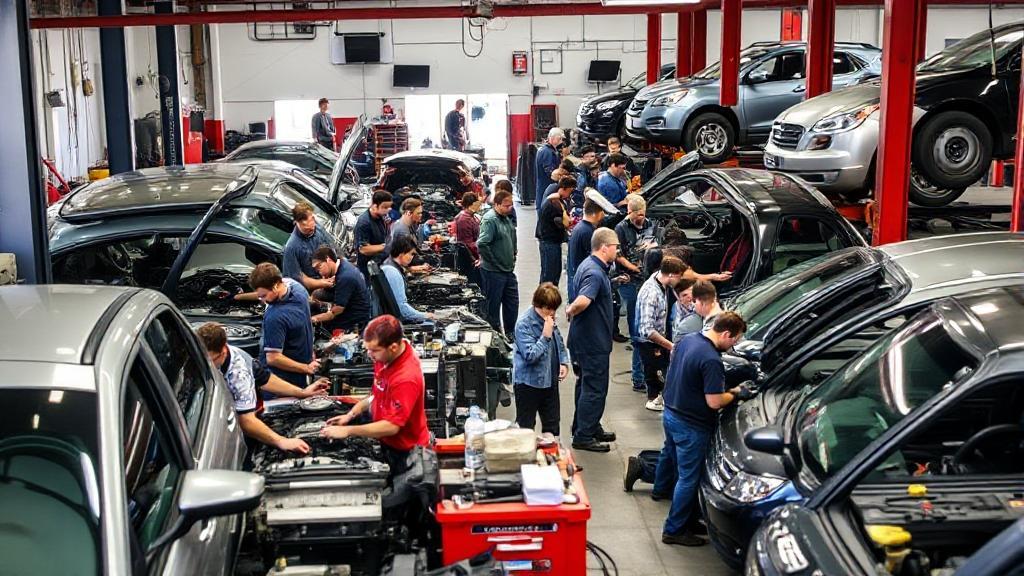Introduction
The automotive industry is a vital part of the global economy, and car mechanics play a crucial role in keeping vehicles running smoothly. Whether you're considering a career as a car mechanic or are simply curious about the profession, understanding the average salary of car mechanics is essential. This guide provides a comprehensive overview of the factors influencing car mechanics' salaries, regional variations, and future trends in the industry.
Factors Influencing Car Mechanic Salaries
Several factors can affect the salary of a car mechanic, including:
- Experience Level: As with many professions, experience plays a significant role in determining salary. Entry-level mechanics typically earn less than their more experienced counterparts.
- Certification and Education: Mechanics with certifications from organizations like the National Institute for Automotive Service Excellence (ASE) often command higher salaries, earning 15-20% more than non-certified peers.
- Location: Geographic location can significantly impact salary. Mechanics in urban areas or regions with a high cost of living may earn more than those in rural areas.
- Type of Employer: Working for a dealership, independent repair shop, or as a self-employed mechanic can influence earnings.
- Specialization: Mechanics who specialize in certain areas may earn higher wages due to their specialized skills.
Average Salary Overview
According to the U.S. Bureau of Labor Statistics, the median annual wage for automotive service technicians and mechanics was approximately $46,880 as of May 2022.
Experience-Based Earnings
- 0-2 years: $30,000 - $35,000
- 3-5 years: $35,000 - $45,000
- 5-10 years: $45,000 - $60,000
- 10+ years: $60,000 - $100,000+
Geographic Variations
Notable metropolitan areas and their average salaries:
- San Francisco, CA: $62,780
- New York City, NY: $58,940
- Chicago, IL: $49,830
- Houston, TX: $46,570
- Miami, FL: $43,250
Workplace Settings
| Workplace Type | Average Salary Range |
|---|---|
| Dealerships | $45,000 - $75,000 |
| Independent Shops | $35,000 - $60,000 |
| Fleet Services | $40,000 - $65,000 |
| Mobile Mechanics | $35,000 - $80,000 |
High-Paying Specializations
- Diesel Engine Specialist: $48,500 - $75,000
- Race Car Mechanic: $45,000 - $150,000
- Aircraft Mechanic: $55,000 - $100,000
- Electric Vehicle Specialist: $50,000 - $120,000
Additional Income Sources
Many mechanics supplement their base salary through:
- Commission-based work
- Overtime pay (typically 1.5x regular rate)
- Tool allowances
- Performance bonuses
- Certification bonuses
Benefits Package Value
Beyond base salary, mechanics often receive:
- Health insurance
- Retirement plans (401k)
- Paid time off
- Sick leave
- Tool insurance
- Uniform allowance
Future Trends and Career Advancement
The automotive industry is evolving rapidly, with advancements in technology and a shift towards electric vehicles. Senior positions offer higher compensation:
Management Roles
- Shop Manager: $55,000 - $85,000
- Service Director: $70,000 - $120,000
- Technical Trainer: $60,000 - $90,000
Emerging Specialties
- EV Battery Specialist
- Autonomous Vehicle Technician
- Diagnostic Technology Expert
- Alternative Fuel Systems Specialist
Tips for Maximizing Earnings
- Obtain and maintain ASE certifications
- Pursue specialized training
- Consider moving to high-paying markets
- Develop diagnostic expertise
- Build a strong reputation for quality work
- Stay current with emerging technologies
For more information on becoming a car mechanic, consider exploring resources from the National Institute for Automotive Service Excellence and the Automotive Service Association.
